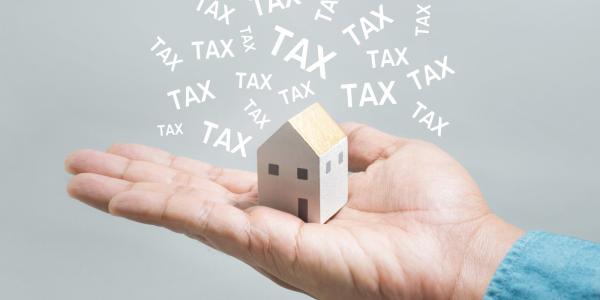Council tax and Northern Ireland rates
Council tax is collected in England, Wales and Scotland (although there are some regional differences). In Northern Ireland, there is a rates system instead of council tax. Collection of council tax and rates is carried out by your local council.

Content on this page:
Overview
Council tax is a primary ‘local tax’ which applies in Great Britain. In Northern Ireland, the equivalent tax to council tax is called rates.
The money collected through these property taxes goes to local authorities (councils) to pay for local services such as maintaining parks, collecting rubbish, policing and personalised care.
These taxes apply to domestic properties, sometimes referred to as ‘dwellings’, including houses, flats, mobile homes, caravans and boats, which are used as the homes of individuals. It does not matter whether they are rented or owned outright. This can also include self-contained accommodation within a property.
Some dwellings are exempt, including property wholly occupied by students as their full-time or term-time residence. We discuss this later on this page.
How council tax is charged
Council tax is payable on a ‘dwelling’. The amount of tax payable is based upon the value of the dwelling concerned, rather than the income of the individuals who occupy it. It may be reduced where there is only one occupier.
Council tax is calculated for the year from 1 April to 31 March and is adjusted appropriately when a change of circumstances affects the bill, such as the property becoming or ceasing to be eligible for an exemption or reduction. This means that you need to notify your council of changes affecting your liability.
Further guidance is available on GOV.UK.
Rented property
If the property concerned is rented out, the responsibility for paying council tax depends on what sort of letting arrangement you have. You can find more information on GOV.UK.
If you are renting the whole of a property, then it will probably be your responsibility to pay the council tax. You should check your tenancy agreement to confirm the position. If you rent the property with another person or persons, you may be jointly responsible with them for paying the council tax.
If you are living in a 'house in multiple occupation' (HMO) the landlord will probably receive the bill. This can include a shared house where three or more tenants each have an agreement with the landlord to rent their own bedroom and use the shared facilities (kitchen, bathroom, living rooms). There is more information about HMOs on GOV.UK.
Reduction for sole occupation
Council tax is generally payable by all households. If there is only one adult in a household, then they may be eligible for a discount of 25%.
When calculating the number of members of a household, certain groups are excluded such as full-time students and anyone aged under 18. There is a list of who is not classed as an adult for council tax on GOV.UK.
There is an exemption if you are under 20 years old and studying for your A-levels; the conditions are explained on GOV.UK.
We have more information about student households below.
Claiming council tax reduction (CTR)
If you are eligible then you can apply for a reduction through your local council.
Your eligibility will depend on:
- where you live
- your circumstances
- your household income
- if your children live with you
- if other adults live with you.
For more information and to apply in England and Wales see GOV.UK. For Scotland, see the Scottish government website. There is a different scheme in Northern Ireland.
Student households
As a student, you would be disregarded from being classed as an adult for council tax provided all the following are met:
- you are undertaking a full-time program of study, tuition or work experience at a recognised establishment,
- of at least one year,
- which lasts at least 24 weeks in each academic or calendar year, and
- which amounts to an average of at least 21 hours per week during term time in each academic or calendar year.
However, once you reach the official end date of your course you will be classed as an adult for council tax purposes and will no longer be exempt as a student.
Generally, if you live in a household where everyone is a full-time student, then the household will be exempt from paying council tax.
It is worth checking with your university’s advice and counselling service to see if they offer any help in dealing with council tax. If you do need to provide evidence, then you will need to submit a certificate of enrolment to your local authority’s council tax office. This can usually be obtained from your student enquiries centre.
A new certificate of enrolment will need to be sent to your local authority’s council tax office at the start of each academic year.
It is your responsibility (nor your landlord’s) to make sure your local authority has the correct documentation.
However, it may be the case that you are not living in a household that is eligible for a full exemption.
For example, you or one of your household could be a part-time student. Or it may be the case that one of your household decides to leave their course and no longer be a student.
If it is the case that not all your household are full-time students, then you may be able to reduce the amount of council tax that the household is required to pay. Although the local council set a rate of council tax for each band, this amount may be reduced by:
- exemptions: total removal from charge
- discounts: a partial removal from charge
- council tax reduction: a reduction in the charge.
These exemptions, discounts and reductions are not necessarily applied consistently across councils, so it is important to check the rules applied by your own specific council.
If not all students are in full-time education, then there is usually one council tax bill for the household. However, if you are a full-time student you will be treated as exempt for the purpose of council tax, so you are not jointly liable with the person who is not a full-time student.
Your housemates who are not students will be liable for the bill for the period in which they live there even if they are not named in the tenancy agreement.
- Student halls of residence
-
Halls of residence are likely to be classed as ‘exempt dwellings’ so you do not have to pay council tax.
- Students on sandwich courses
-
If you are a student on a sandwich course, you should remain exempt provided the total time spent on the work placement does not exceed the total combined periods of study. You may have to provide a certificate of enrolment from your university confirming that you are a full-time student.
- International students living with a non-student spouse/civil partner
-
The chargeability for council tax position depends on the status of the non-student spouse and/or civil partner.
If your spouse and/or civil partner is either:
- a British citizen, or
- settled in the UK with indefinite leave to enter or remain.
then the household will not be exempt, as they will count as an adult. If your spouse and/or civil partner is the only person who is not a student living in the household, then a discount may be available. You will need to check with your local council.
If your spouse or civil partner is the only person who is not a student living in the house and they are not a British citizen then special rules apply and you may want to ask for guidance from a welfare rights adviser, such as Citizens Advice.
- Postgraduate students
-
You do not have to physically attend a particular education establishment to be disregarded from council tax as a full-time student.
If you are a postgraduate student writing up your thesis, then it depends on your university whether you will be provided with a letter from them stating that you are a full-time student. As this varies between different universities you should ask for guidance from your supervisor or the university’s advice service.
However, if you are a part-time student then you cannot claim a council tax exemption, but you may be eligible for a reduction, as explained under the heading above, Claiming council tax reduction.
- Moving student accommodation
-
If moving either within the same borough or to a new borough you should inform the relevant local council tax offices of your change of address and the date you moved. Many local authorities have forms on their websites which you will need to complete.
- Student tenancy agreements
-
If you are a full-time student, any conditions in your tenancy agreement stating that you will pay council tax should not take away your right to be treated as exempt from being an adult for the purposes of council tax.
However, if there is a council tax liability (such as in the case when there are not all full-time students occupying the property) and you do not pay, then your landlord may treat this as a breach of your rental lease agreement. If this happens then we recommend you seek independent legal advice.
- Studying in Northern Ireland or Scotland
-
Northern Ireland and Scotland administer this local tax differently for students compared to the rules in England and Wales.
For students living in Northern Ireland there is information available in A guide to Rates. If you are renting your property, you can find more information from nidirect.
If you are a student living in Scotland and reside in a household where everyone is a full-time student, then no council tax should be due. Further information can be found from the Scottish government website, which provides links to all the Scottish councils.
More information
The Valuation Office Agency’s (VOA) technical manual for assessing domestic property for council tax is on GOV.UK.
You can find some basic information about council tax on GOV.UK, along with a further collection of information.
You can find specific Scottish information from the Scottish government and Welsh information from the Welsh government.
For rates in Northern Ireland, you can find out more on the nidirect website.



